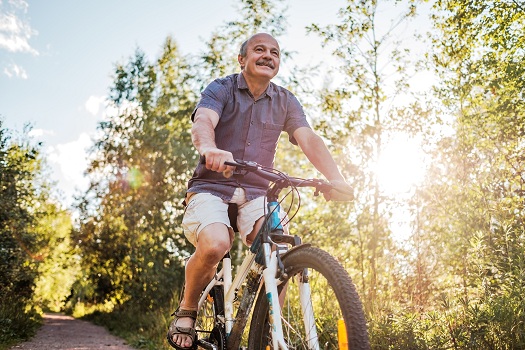As seniors grow older, their muscles naturally become weaker, a biological phenomenon known as sarcopenia. This weakening of the muscles isn’t dangerous, but it could negatively impact a senior’s quality of life. Sarcopenia makes it difficult for older adults to get out of their homes and experience the world. It also increases the risk of a life-altering slip-and-fall injury. Here are a handful of tips that can help seniors reverse muscle loss while boosting their overall health.
1. Get Regular Exercise
It should come as no surprise that exercising is the most effective way to reverse muscle loss. Most experts agree older adults should try to exercise for at least 150 minutes a week, and training needs to be split up between aerobic and anaerobic activities, including hiking, going on walks, swimming, riding a bike, and lifting weights. Seniors who don’t enjoy traditional exercises might want to try dance classes, gardening, co-ed sports, or yoga.
Seniors with mobility limitations or health conditions may need help to exercise safely. Families who find it difficult to care for their aging loved ones without assistance can benefit greatly from professional respite care. Anchorage, Alaska, family caregivers who need a break from their caregiving duties can turn to Home Care Assistance. Using our proprietary Balanced Care Method, our respite caregivers can encourage your loved one to eat well, exercise regularly, get plenty of mental and social stimulation, and focus on other lifestyle factors that promote longevity.
2. Increase Dietary Protein Intake
Training a muscle creates millions of microscopic tears in the soft tissue. The body then breaks down dietary protein and uses it to repair the damaged tissue. Without enough protein, the body won’t be able to build stronger muscles. While everyone has different dietary needs, most seniors should try to consume at least 50 grams of protein per day.
A trained professional caregiver can help your loved one prepare meals that meet all his or her specific nutritional needs. Though you may be researching multiple agencies that provide home care service, Home Care Assistance has much to offer your family and your elderly loved one. We are leaders in the senior home care industry, offering proprietary programs like our holistic Balanced Care Method and around-the-clock assistance from reliable, experienced caregivers. Trust Home Care Assistance to help your loved one enjoy a happier and healthier life in the golden years.
3. Get Tested for a Vitamin D Deficiency
Vitamin D doesn’t directly build muscle, but it helps the body process dietary protein. One of the most common symptoms of a vitamin D deficiency is muscle loss, and many seniors don’t get enough of this vital nutrient. The best way to produce vitamin D is to get 10 or 15 minutes of sunlight exposure every day. Seniors can also take a high-quality vitamin D supplement or consume dairy products fortified with vitamin D.
4. Don’t Forget to Sleep
Most muscle growth occurs while sleeping, which is one of the reasons chronic sleep deprivation is so devastating. Seniors who don’t get at least seven hours of sleep every night need to rethink their bedtime habits. Avoiding caffeinated products and bright screens later in the day can enhance sleep quality and help seniors get to sleep faster. Seniors might also want to take a look at their medications to see if any of them might be impacting their sleep schedules.
5. Consume Omega-3 Fatty Acids
A recent study published in The American Journal of Clinical Nutrition revealed that fish oil supplements can trigger muscle growth. Omega-3 fatty acids also help with chronic inflammation, which makes exercising much easier. Many companies are now producing high-quality fish oil supplements, but most of a senior’s omega-3 fatty acids should come from fatty fish such as albacore, herring, anchovies, sardines, and salmon.
Muscle loss is one of many conditions seniors need to be aware of so they can make lifestyle choices that promote optimal health. There are a variety of age-related health conditions that can make it more challenging for seniors to live independently. However, many of the challenges they face can be easier to manage if their families opt for professional senior care. Anchorage families can rely on expertly trained caregivers to keep their loved ones safe and comfortable while aging in place. Call Home Care Assistance at (907) 770-0907 to learn more about our flexible and customizable senior care plans.
